Fresh Juices – Drink Life Fresh
Fresh Juices
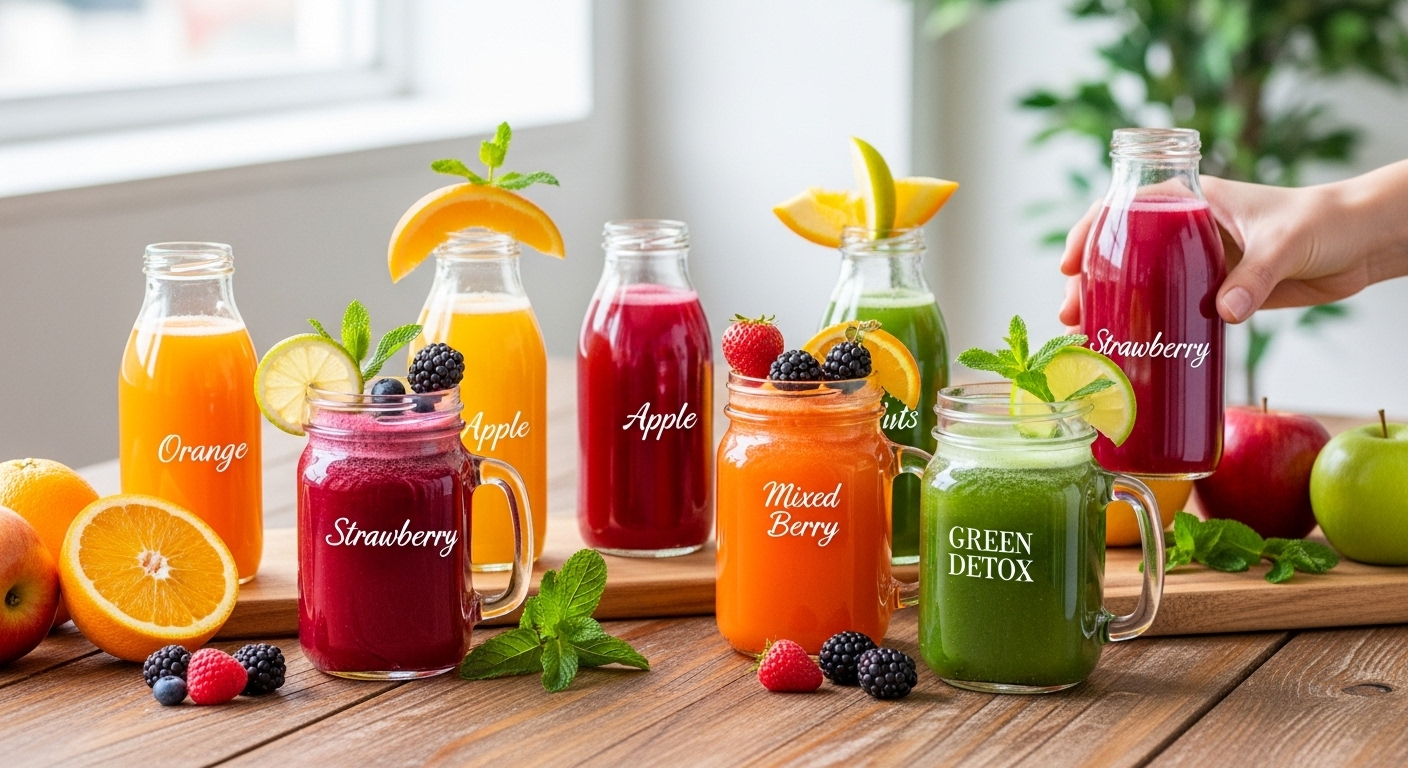
Fresh juices are beverages made by extracting the liquid content directly from fresh fruits and/or vegetables without the use of preservatives, artificial colors, or added sugars. These juices are typically consumed shortly after preparation to retain their natural nutrients, enzymes, and flavor.
Key Features:
- Natural Ingredients: Only fresh produce is used, with no chemical additives.
- Nutrient-Rich: Retains essential vitamins, minerals, and antioxidants.
- Cold or Freshly Extracted: Usually made using blenders, juicers, or manual presses.
- No Pasteurization: Unlike packaged juices, fresh juices are not heat-treated, preserving their nutritional value.
Examples:
- Orange Juice (from freshly squeezed oranges)
- Carrot Juice (from raw carrots)
- Green Juice (blend of leafy greens, cucumber, and apple)
- Beetroot Juice (known for its detoxifying properties)
Introduction to Fresh Juices

Fresh juices have become an essential part of a healthy lifestyle, offering a delicious and convenient way to consume vital nutrients directly from fruits and vegetables. Unlike packaged or processed juices, fresh juices are made without preservatives, added sugars, or artificial flavors, allowing you to enjoy nature’s goodness in its purest form.
By extracting the natural liquids from fresh produce, these juices retain essential vitamins, minerals, antioxidants, and enzymes that support overall well-being. Whether you’re aiming to boost your immunity, detox your body, improve digestion, or simply enjoy a refreshing beverage, fresh juices provide a powerful nutritional punch.
From citrusy orange juice to green blends made with spinach and cucumber, the variety is endless—making it easy to find options that suit your taste and health needs.
Health Benefits of Fresh Juices
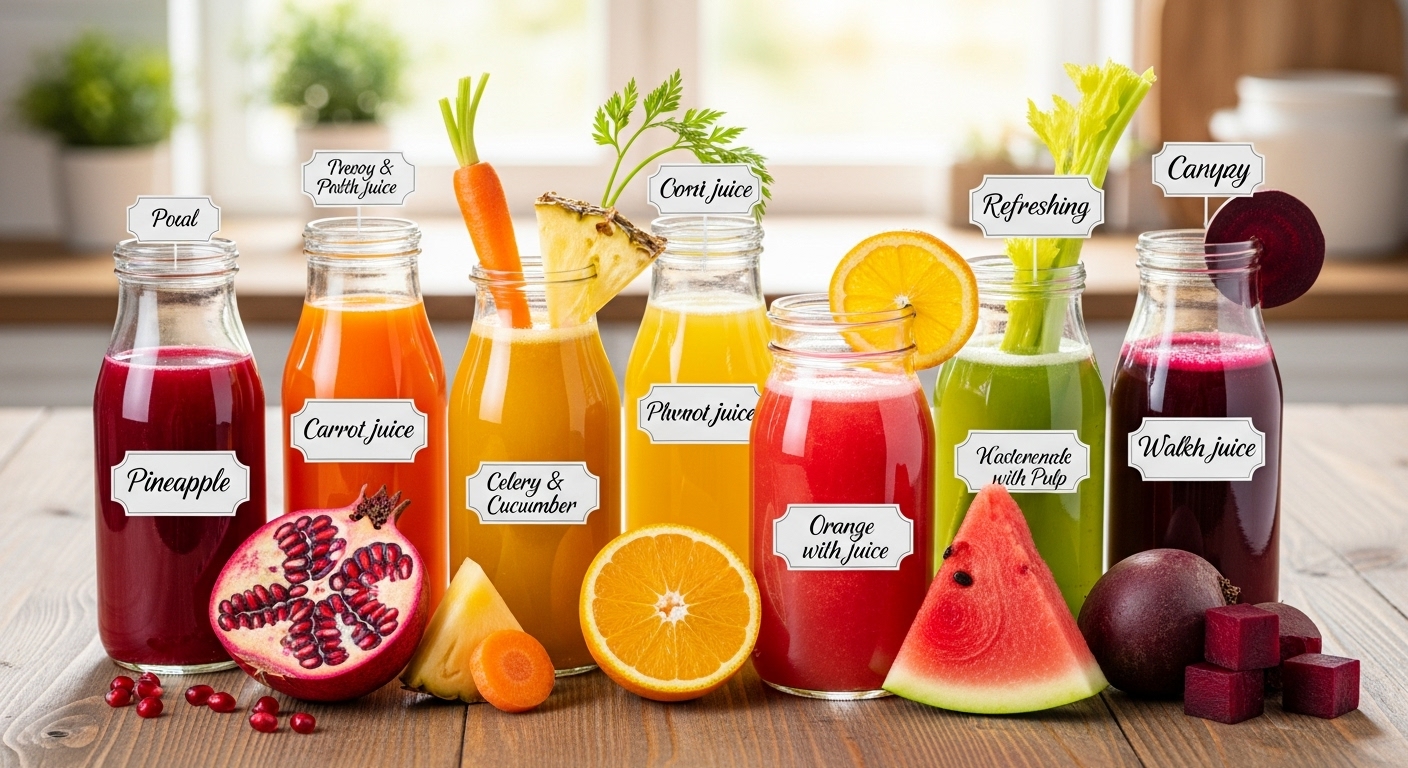
Fresh juices are more than just tasty drinks—they are packed with powerful health benefits that can significantly improve your overall well-being. Here's how they help:
- 🍊 Boosts Immunity: Rich in vitamin C, fruits like oranges, lemons, and amla strengthen your immune system and help fight infections.
- 🧠 Improves Brain Function: Beetroot and leafy greens enhance blood flow to the brain, improving focus, memory, and clarity.
- 💪 Increases Energy Levels: Natural sugars from apples and carrots give a quick, sustained energy boost without crashes.
- 🧽 Aids in Detoxification: Spinach, celery, and cucumber juices help flush toxins from the liver and kidneys.
- 🌿 Supports Digestion: Ginger, mint, and lemon juices stimulate digestive enzymes and ease bloating.
- ❤️ Promotes Heart Health: Antioxidants in pomegranate and grape juices lower bad cholesterol and improve circulation.
- 💧 Keeps Skin Glowing: Hydrating, vitamin-rich juices reduce acne and nourish the skin for a healthy glow.
- ⚖️ Helps in Weight Management: Low-calorie, high-fiber options like cucumber and celery help control hunger and reduce snacking.
Popular Types of Fresh Juices
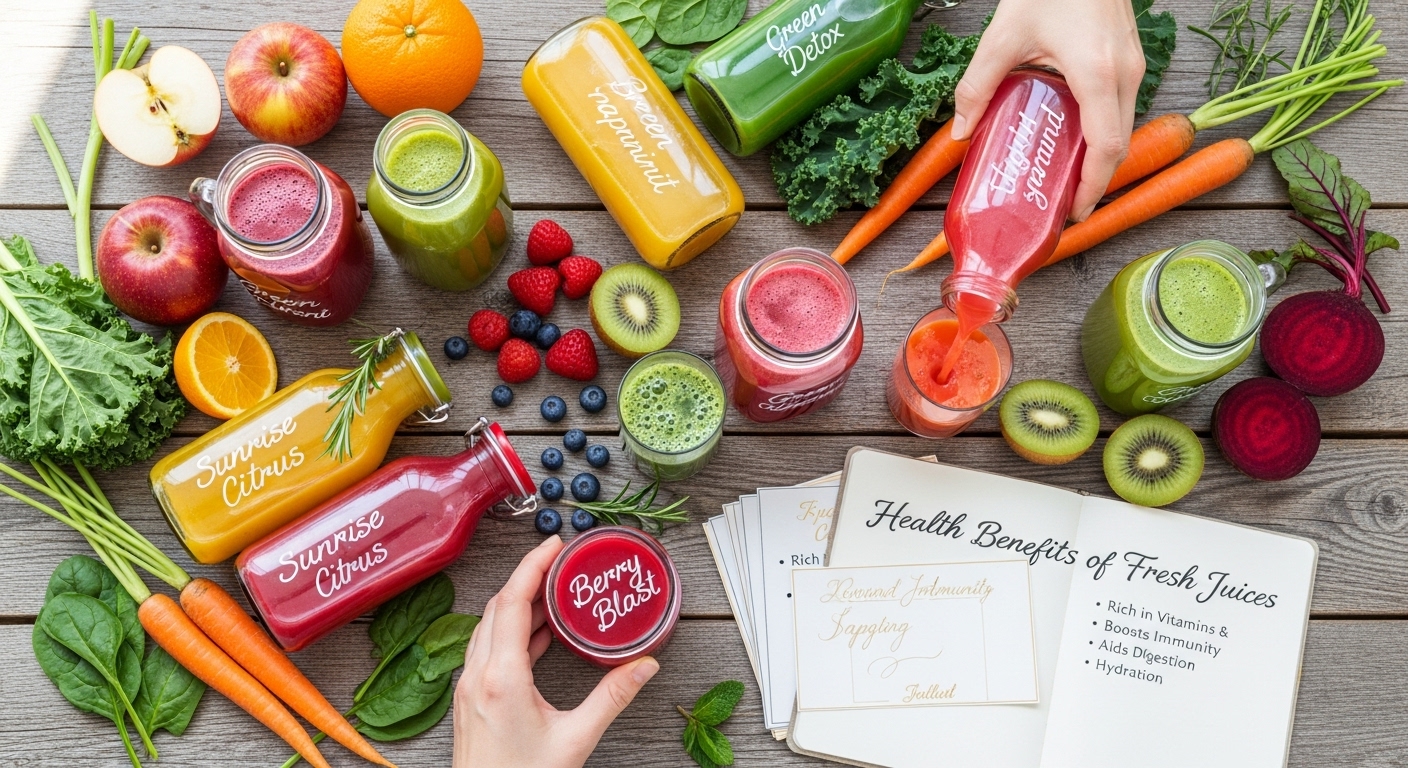
Fresh juices come in a variety of flavors and nutritional profiles, depending on the fruits and vegetables used. Here are the most popular categories:
🍊 1. Citrus Juices
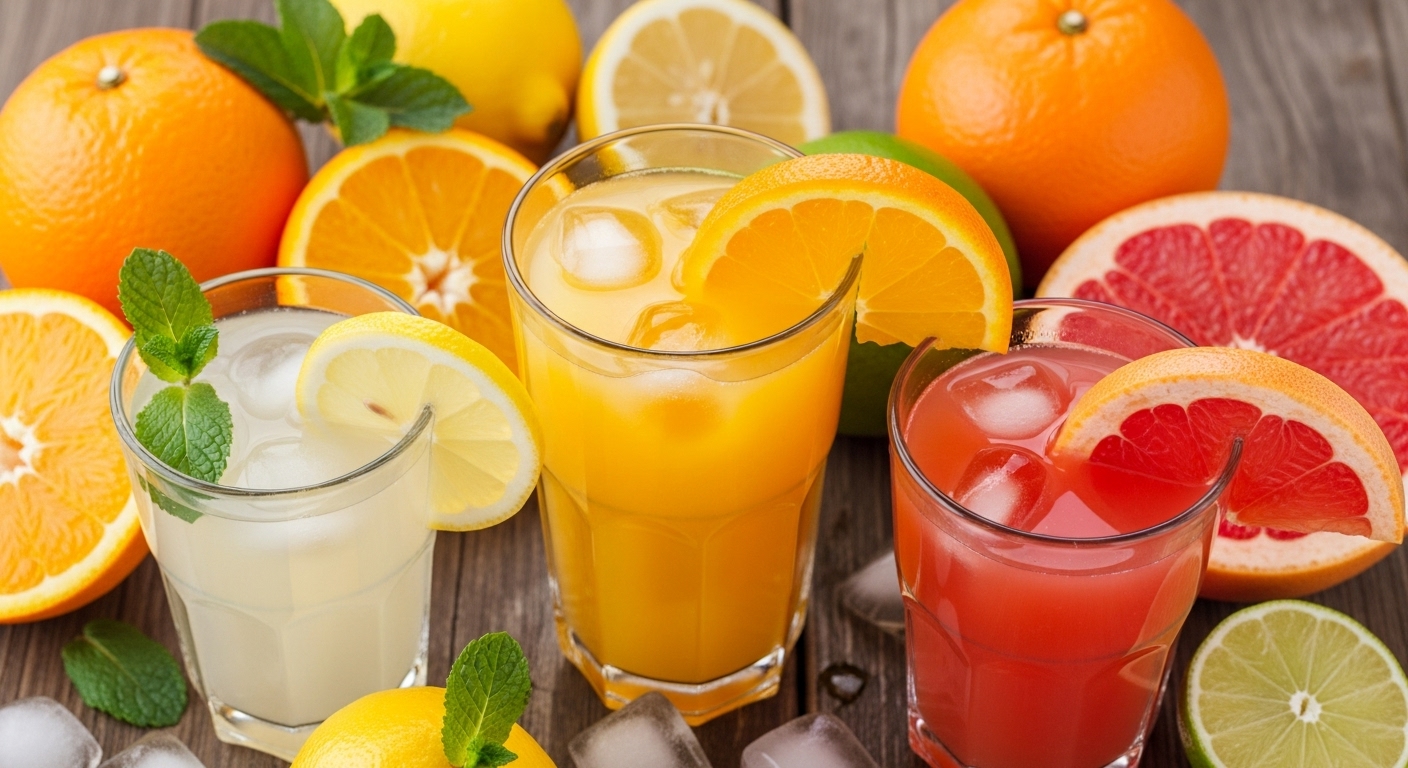
Made From: Oranges, lemons, limes, grapefruits, sweet lime (mosambi)
- High in Vitamin C, great for boosting immunity
- Refreshing and hydrating
- Aids in iron absorption and improves skin health
Popular Examples:
- Fresh orange juice
- Lemon juice with honey and warm water (morning detox)
- Grapefruit juice for fat-burning properties
🌿 2. Green Juices
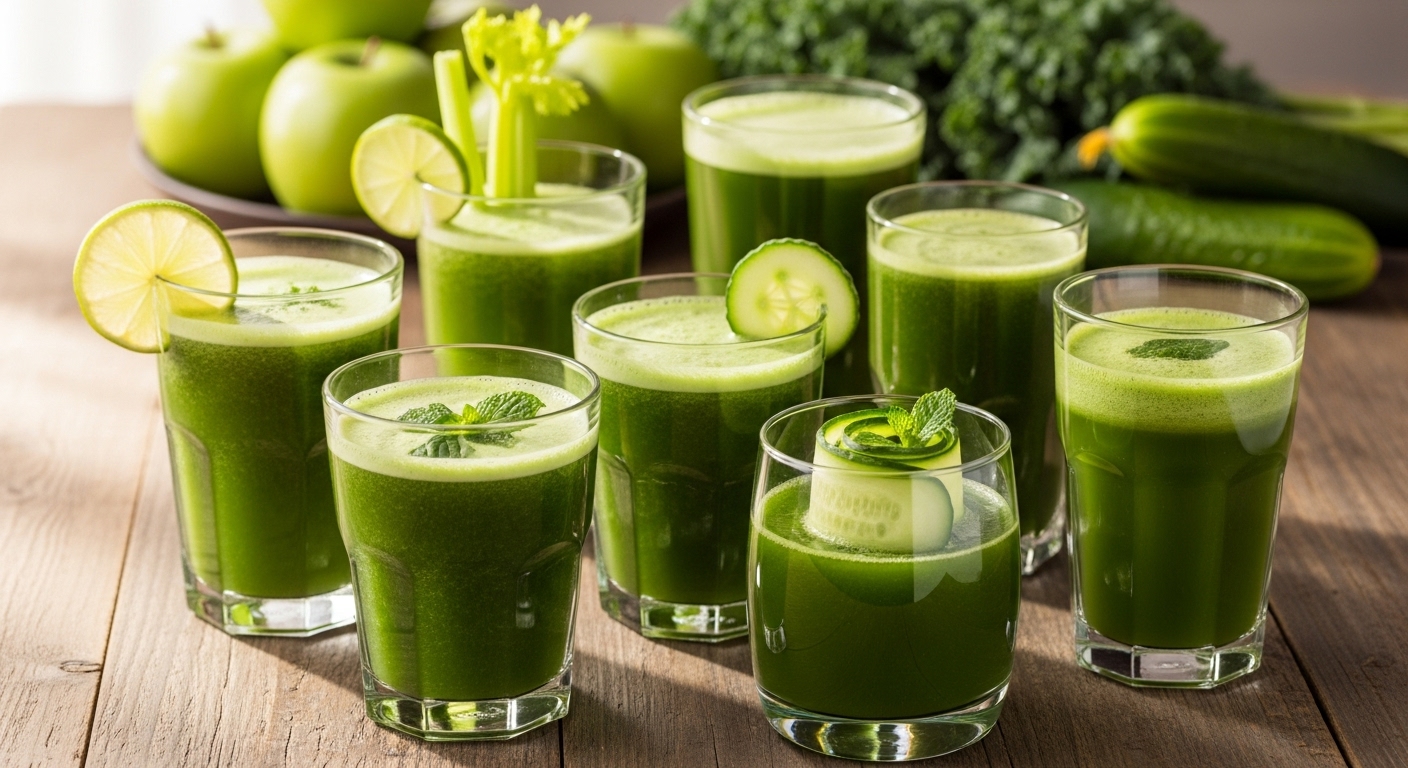
Made From: Spinach, kale, cucumber, celery, mint, parsley, green apple
Benefits:
- Rich in chlorophyll, fiber, and antioxidants
- Excellent for detoxification and digestion
- Promotes glowing skin and weight loss
Popular Examples:
- Spinach + apple + ginger juice
- Cucumber + mint cooler
- Celery + lemon detox juice
🍓 3. Berry Juices
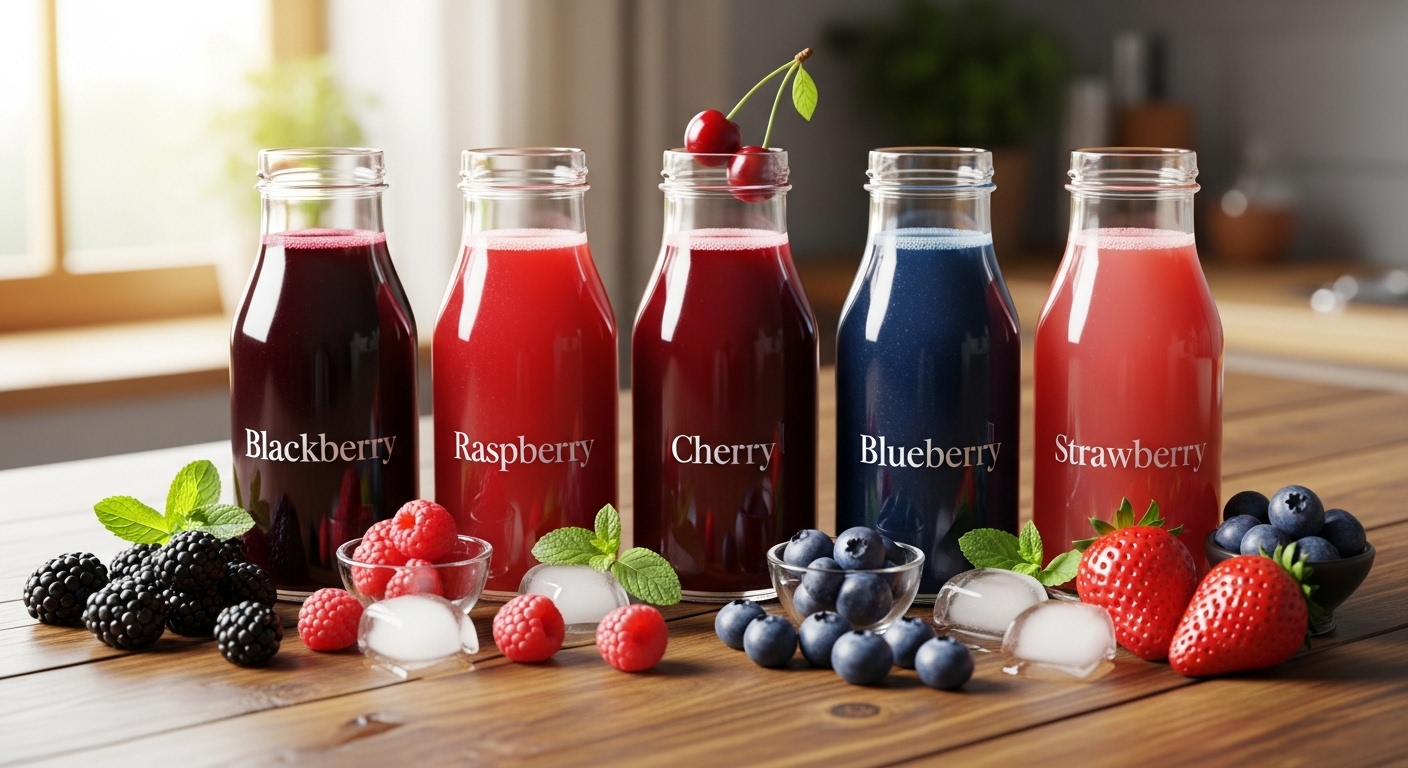
Made From: Strawberries, blueberries, raspberries, blackberries
Benefits:
- Loaded with antioxidants, especially anthocyanins
- Good for heart health and skin repair
- Helps reduce inflammation
Popular Examples:
- Mixed berry juice
- Strawberry + lemon juice
- Blueberry + apple blend
🥭 4. Tropical Juices
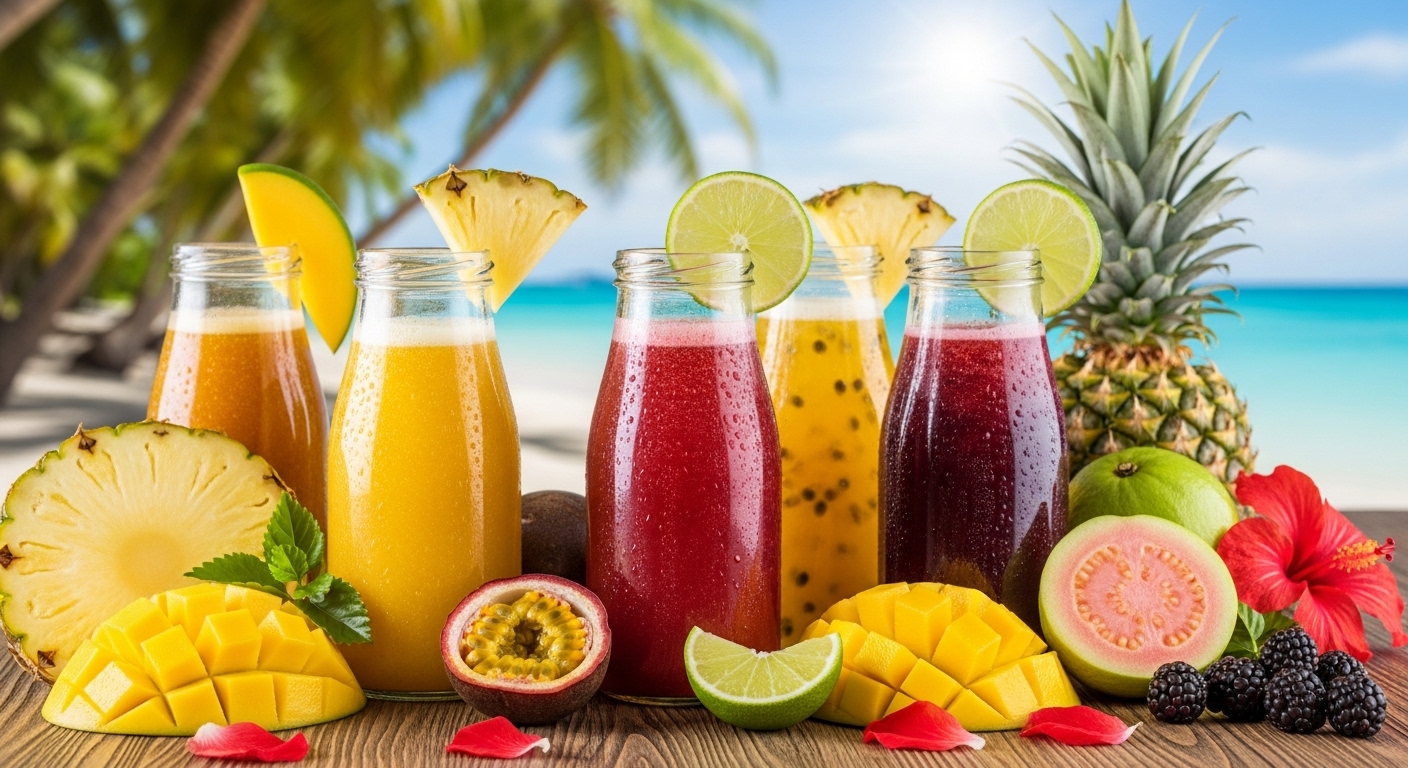
Made From: Mangoes, pineapples, papayas, guavas, coconut water
Benefits:
- Naturally sweet and rich in enzymes like bromelain and papain
- Supports digestion and gut health
- High in vitamins A and C
Popular Examples:
- Mango + orange juice
- Pineapple + coconut water
- Papaya smoothie-style juice
🥕 5. Root-Based Juices
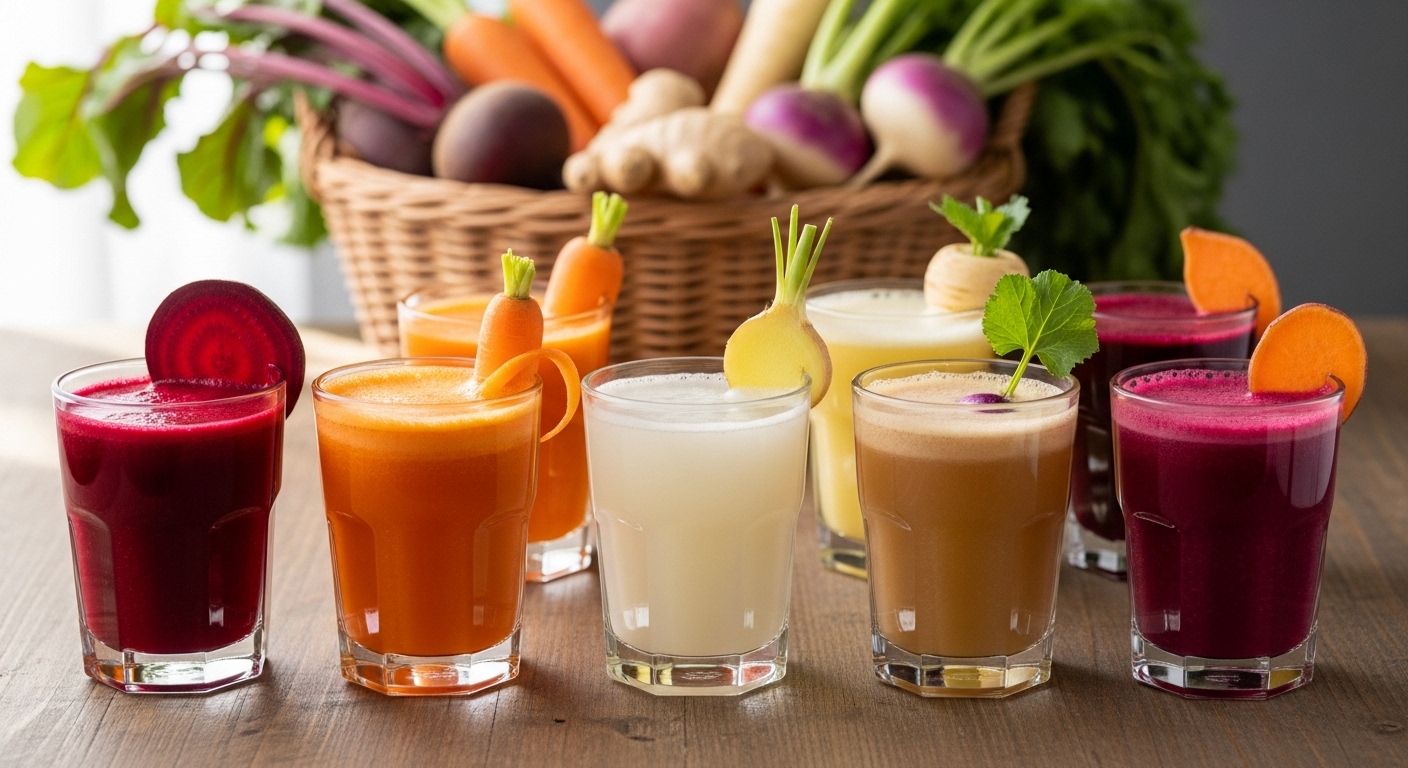
Made From: Carrots, beetroot, ginger, turmeric
Benefits:
- Great for blood purification and energy
- Rich in beta-carotene for eye health
- Anti-inflammatory properties
Popular Examples:
- Carrot + apple + ginger
- Beetroot + lemon
- Turmeric + carrot immunity booster
🏠 Homemade vs Store-Bought Juices
When it comes to choosing between homemade and store-bought juices, both offer convenience and flavor—but their nutritional value, freshness, and health impact can differ greatly. Here's a detailed comparison to help you make an informed choice:
🏡 1. Homemade Juices
✅ Advantages:
- Freshness Guaranteed: Made and consumed immediately, retaining maximum nutrients.
- No Preservatives: Free from artificial colors, flavors, and chemicals.
- Customizable: Adjust sweetness, ingredients, and combinations as per your needs.
- Higher Nutrient Content: Especially enzymes, antioxidants, and vitamins which degrade over time in packaged juices.
⚠️ Considerations:
- Requires time for preparation and cleaning.
- Short shelf life (consume within a few hours or refrigerate for max 24 hours).
- Needs access to fresh produce and a juicer/blender.
Best For: Those prioritizing health, purity, and control over ingredients.
🛒 2. Store-Bought Juices
✅ Advantages:
- Convenience: Ready-to-drink, ideal for busy lifestyles.
- Longer Shelf Life: Pasteurized or preserved to last weeks/months.
- Wide Variety: Available in many flavors and blends, some fortified with extra nutrients.
⚠️ Considerations:
- May contain additives like added sugars, preservatives, or artificial flavors.
- Lower nutritional value due to pasteurization (destroys heat-sensitive vitamins like Vitamin C).
- Some contain only a small percentage of actual fruit juice.
Best For: Those needing on-the-go convenience and flavor—just read labels carefully.
🔍 Final Verdict:
| Feature | Homemade Juice | Store-Bought Juice |
|---|---|---|
| Freshness | ✅ Very High | ❌ Usually Low |
| Nutrient Retention | ✅ Excellent | ❌ Often Reduced |
| Preservatives/Additives | ❌ None | ✅ Often Present |
| Customization | ✅ Fully Customizable | ❌ Limited |
| Shelf Life | ❌ Short (0–1 day) | ✅ Long (weeks/months) |
| Convenience | ❌ Time-consuming | ✅ Quick & Easy |
🕒 Best Time to Drink Fresh Juice
Drinking fresh juice at the right time can enhance its health benefits and improve nutrient absorption. Here's a detailed guide on the best times to consume fresh juice for maximum impact:
🌅 1. Early Morning (On an Empty Stomach) – ✅ Best Option
Why: Your stomach is clean and ready to absorb nutrients efficiently.
Benefits: Boosts metabolism, detoxifies the liver, energizes the body.
Best Choices:
- Lemon + warm water (for detox)
- Carrot + beetroot juice (for blood purification)
- Green juice (for digestion and energy)
🕘 2. Mid-Morning (Between 9 AM – 11 AM)
Why: Perfect time if you had a light breakfast and need a nutritional boost.
Benefits: Provides energy without heaviness; keeps you full until lunch.
Best Choices:
- Orange or sweet lime (mosambi) juice
- Pineapple or apple juice
🕓 3. Pre-Workout
Why: Provides natural sugars and hydration before physical activity.
Benefits: Increases stamina and endurance.
Best Choices:
- Beetroot juice (improves blood flow and oxygen delivery)
- Banana + date smoothie-style juice
🥗 4. Along With or After Meals – ❌ Not Recommended
Why Not: Can interfere with digestion, slow down enzyme activity.
Better Tip: If you must, wait at least 30–45 minutes after meals.
🌇 5. Evening (4 PM – 6 PM)
Why: A healthy alternative to tea/coffee or processed snacks.
Benefits: Keeps energy stable and prevents overeating later.
Best Choices:
- Mixed fruit juice
- Cucumber + mint cooler
- Coconut water blend
🌙 6. Night Time – ⚠️ Caution Advised
Why Not: Can cause bloating or affect digestion if taken too close to bedtime.
If Needed: Drink at least 2 hours before sleep and avoid citrus or high-sugar juices.
✅ Pro Tips:
- Always drink juice immediately after preparation for maximum nutrient value.
- Prefer room temperature or slightly cool juices over refrigerated or icy ones.
- Avoid adding refined sugar; use honey or natural fruit sweetness if needed.
🥤 Juicing Tips for Beginners
Starting your juicing journey can be exciting and rewarding—if done right. Whether you’re juicing for health, weight loss, or energy, here are the most important beginner-friendly tips to make your experience easy, healthy, and effective:
✅ 1. Start Simple
Use 2–3 ingredients per juice at first.
Examples:
- Carrot + Apple
- Cucumber + Mint
- Orange + Ginger
Too many ingredients can overwhelm your digestive system and palate.
🧼 2. Wash Produce Thoroughly
Always clean fruits and vegetables to remove pesticides, dirt, and bacteria.
Prefer organic produce when possible.
⚖️ 3. Balance Fruits and Veggies
Fruits are sweet but high in natural sugar. Mix with vegetables to avoid sugar spikes.
Ratio tip: 70% vegetables + 30% fruits for a healthier juice.
🕒 4. Drink Juice Immediately
Fresh juice loses nutrients quickly. Consume within 15–30 minutes of preparation for maximum benefit.
❌ 5. Don’t Rely Only on Juice
Juicing is a supplement—not a substitute—for whole foods. Include solid fruits, veggies, protein, and fiber in your diet.
🌡️ 6. Avoid Cold or Icy Juices
Very cold juices can shock your digestive system, especially in the morning. Prefer room temperature or slightly chilled juice.
🧃 7. Don’t Add Sugar or Salt
Let the natural sweetness of fruits and herbs shine. You can enhance flavor with:
- Lemon or lime juice
- Ginger
- Mint or basil
🧴 8. Use the Right Equipment
Beginners can start with:
- Centrifugal juicer – fast but may lose nutrients due to heat.
- Cold press (masticating) juicer – slower but retains more nutrients.
- Blender + strainer – affordable option for soft fruits and greens.
🧃 9. Store Juice Properly (if needed)
If storing, use glass airtight jars. Refrigerate and consume within 24 hours max.
📔 10. Keep a Juice Journal
Note down ingredients, taste, energy levels, digestion changes, etc. Helps track what works best for your body.
🧪 Nutritional Breakdown of Common Fresh Juices
Understanding the nutritional content of popular fresh juices can help you choose the right one based on your health goals—be it energy, immunity, detox, or digestion. Here's a quick overview of common juices and what they offer per 1 glass (approx. 250 ml):
- 🍊 1. Orange Juice
Calories: 110 kcal
Vitamin C: 125% RDA
Potassium: 500 mg
Natural Sugars: 21 g
Benefits: Boosts immunity, skin health, fights fatigue - 🥕 2. Carrot Juice
Calories: 95 kcal
Vitamin A (Beta-Carotene): 400% RDA
Vitamin K: 35% RDA
Fiber: Low
Benefits: Eye health, glowing skin, antioxidant-rich - 🍎 3. Apple Juice
Calories: 115 kcal
Vitamin C: 10% RDA
Potassium: 250 mg
Natural Sugars: 24 g
Benefits: Energy booster, supports heart health - 🍇 4. Pomegranate Juice
Calories: 135 kcal
Antioxidants: High in polyphenols
Vitamin C: 30% RDA
Natural Sugars: 26 g
Benefits: Heart health, improves blood circulation - 🍋 5. Lemon Juice (Diluted in Water)
Calories: 10–15 kcal
Vitamin C: 50% RDA
Citric Acid: Helps digestion
Benefits: Detox, alkalizes the body, supports weight loss - 🥬 6. Green Juice (Spinach + Cucumber + Apple)
Calories: 70–90 kcal
Iron: Moderate
Vitamin K: High
Chlorophyll: Rich
Benefits: Detox, improves skin and digestion - 🍍 7. Pineapple Juice
Calories: 130 kcal
Vitamin C: 100% RDA
Bromelain Enzyme: Aids digestion
Natural Sugars: 25 g
Benefits: Anti-inflammatory, boosts metabolism - 🥤 8. Beetroot Juice
Calories: 100 kcal
Nitrates: Improves blood flow
Iron & Folate: High
Benefits: Increases stamina, purifies blood
📊 Quick Comparison Table
| Juice Type | Calories | Vitamin C | Unique Nutrients | Main Benefits |
|---|---|---|---|---|
| Orange | 110 kcal | ★★★★★ | Potassium | Immunity, fatigue recovery |
| Carrot | 95 kcal | ★★☆☆☆ | Beta-Carotene, Vit K | Eye health, skin glow |
| Apple | 115 kcal | ★☆☆☆☆ | Potassium, Fiber (low) | Energy, digestion support |
| Pomegranate | 135 kcal | ★★★☆☆ | Polyphenols | Heart, blood circulation |
| Lemon (diluted) | 10–15 kcal | ★★★★☆ | Citric acid | Detox, digestion |
| Green Juice | 70–90 kcal | ★★☆☆☆ | Chlorophyll, Iron | Detox, skin, digestion |
| Pineapple | 130 kcal | ★★★★★ | Bromelain enzyme | Anti-inflammatory, digestion |
| Beetroot | 100 kcal | ★★☆☆☆ | Nitrates, Iron, Folate | Blood purifier, stamina booster |
🧃 Detox and Weight Loss Juices
Fresh juices can play a powerful role in detoxifying the body and supporting healthy weight loss when included as part of a balanced diet. These juices are rich in fiber, antioxidants, and enzymes that flush out toxins, boost metabolism, and reduce bloating—naturally and deliciously.
🍋 1. Lemon + Ginger Detox Juice
Ingredients: Lemon juice, ginger, warm water, a pinch of cayenne pepper
Benefits: Boosts metabolism, aids digestion, alkalizes the body
Best Time to Drink: Early morning on an empty stomach
🥬 2. Green Detox Juice
Ingredients: Spinach, cucumber, celery, green apple, lemon
Benefits: High in fiber and chlorophyll, supports liver cleansing and weight control
Best Time to Drink: Mid-morning or before meals
🥒 3. Cucumber + Mint Cooler
Ingredients: Cucumber, mint leaves, lemon juice, water
Benefits: Extremely hydrating, reduces bloating, flushes out toxins
Best Time to Drink: Afternoon or post-workout
🍍 4. Pineapple + Ginger Juice
Ingredients: Pineapple chunks, ginger, lemon
Benefits: Contains bromelain enzyme that improves digestion and burns fat
Best Time to Drink: Mid-morning snack
🥕 5. Carrot + Beetroot Juice
Ingredients: Carrots, beetroot, ginger, lemon
Benefits: Purifies blood, improves stamina, low in calories but nutrient-rich
Best Time to Drink: Early morning or before lunch
🍏 6. Apple + Cinnamon Water Juice
Ingredients: Apple slices, cinnamon stick, water
Benefits: Controls cravings, stabilizes blood sugar, boosts fat metabolism
Best Time to Drink: Sipped throughout the day
🔥 7. Aloe Vera + Amla Juice
Ingredients: Fresh aloe vera gel, amla (Indian gooseberry), water
Benefits: Cleanses digestive tract, improves metabolism, rich in Vitamin C
Best Time to Drink: On an empty stomach
✅ Detox & Weight Loss Tips:
- Drink juice fresh (within 15–30 minutes of preparation)
- Don’t add sugar or salt—use lemon or ginger for flavor enhancement
- Combine juices with healthy meals and exercise for sustainable results
- Stay hydrated throughout the day
🛡️ Juicing for Immunity Boost
Fresh juices are a natural and effective way to strengthen your immune system. Rich in vitamin C, antioxidants, minerals, and anti-inflammatory compounds, these juices help your body fight infections, reduce inflammation, and stay energized—especially during seasonal changes or viral outbreaks.
🍊 1. Orange + Turmeric Juice
Ingredients: Oranges, fresh turmeric root (or turmeric powder), black pepper
Immunity Power:
- Vitamin C boosts white blood cells
- Turmeric is anti-inflammatory and antimicrobial
- Pro Tip: A pinch of black pepper enhances turmeric absorption
🍏 2. Apple + Ginger + Lemon Juice
Ingredients: Green apple, ginger root, lemon juice, water
Immunity Power:
- Ginger fights infections and soothes inflammation
- Lemon provides Vitamin C and alkalizes the body
🥕 3. Carrot + Orange + Ginger Juice
Ingredients: Carrots, oranges, ginger, lemon
Immunity Power:
- High in beta-carotene (Vitamin A precursor)
- Supports mucous membrane health (first line of immune defense)
🧄 4. Beetroot + Garlic + Apple Juice
Ingredients: Beetroot, garlic clove, apple, lemon
Immunity Power:
- Garlic has antiviral and antibacterial properties
- Beetroot improves blood circulation and detox
🥭 5. Amla (Indian Gooseberry) Juice
Ingredients: Amla pulp, water, honey (optional)
Immunity Power:
- One of the richest sources of Vitamin C
- Antioxidant-rich and supports liver function
🥬 6. Green Immunity Juice
Ingredients: Spinach, kale, parsley, green apple, lemon
Immunity Power:
- Loaded with chlorophyll, Vitamin C, and folate
- Supports detox and immune cell production
🥤 Tips for Maximum Immunity Boost:
- Drink juice fresh, preferably in the morning
- Avoid sugar and artificial sweeteners
- Add a pinch of black pepper or cinnamon for extra antioxidant power
- Combine juices with proper sleep, hydration, and exercise for best results
🧊 Juice Storage & Preservation Tips
Fresh juice is healthiest when consumed immediately, but if you need to store it, proper techniques can help preserve its taste, color, and nutrients. Here are essential tips for storing fresh juice safely and effectively:
🕒 1. Drink Within 24–48 Hours
- Best Practice: Consume juice within 24 hours for maximum nutrition.
- Limit: Up to 48 hours if stored properly in a fridge, though some nutrients (especially Vitamin C) will degrade.
🧴 2. Use Airtight Glass Containers
- Why Glass? It doesn’t react with acids and preserves taste better than plastic.
- Airtight is Essential: Prevents oxygen from degrading vitamins and flavor.
- ✅ Tip: Fill the container to the top to minimize air space (oxidation).
❄️ 3. Refrigerate Immediately
- Store juice at 4°C (39°F) or colder.
- Keep it in the coldest part of your fridge, not the door.
⚫ 4. Minimize Light & Air Exposure
- Light breaks down nutrients, especially in green and citrus juices.
- Use opaque bottles or wrap clear jars with foil or a cloth.
🧃 5. Freeze for Long-Term Storage (Max: 2–3 Months)
- Leave space in the container (juice expands when frozen).
- Label with date and ingredients.
- Thaw in fridge, not at room temperature.
- ⚠️ Avoid repeated freezing and thawing—it destroys taste and texture.
🧂 6. Avoid Adding Sugar or Salt for Preservation
These interfere with the natural composition and health value of juice. Stick to lemon, ginger, or turmeric for natural preservation and added benefits.
🍋 7. Add Natural Preservers (Optional)
- Lemon or Lime Juice: High in Vitamin C, slows oxidation
- Turmeric: Antibacterial properties
- Ginger: Anti-inflammatory and preserves freshness
🔬 8. Watch for Spoilage Signs
Change in color, sour or foul smell, fizzy texture—these mean it's spoiled. When in doubt, throw it out.
✅ Quick Storage Checklist:
| Tip | Why It Matters |
|---|---|
| Use airtight glass bottles | Prevents oxidation & spoilage |
| Fill to top | Reduces air exposure |
| Store in fridge immediately | Preserves nutrients & taste |
| Drink within 24–48 hours | Best for freshness & health benefits |
| Add lemon/ginger/turmeric | Natural preservatives |
| Avoid plastic containers | Chemical-free storage |
⚠️ Common Mistakes to Avoid in Juicing
Juicing can supercharge your health—but only if done right. Many beginners (and even regular juicers) unknowingly make mistakes that reduce the benefits or even harm their health over time. Here are the most common juicing mistakes you should avoid:
- ❌ 1. Using Too Much Fruit
Problem: High natural sugar = blood sugar spikes
Fix: Balance fruits with vegetables (e.g., 70% veggies, 30% fruits)
Better Choice: Apple + spinach instead of all-fruit blends - ❌ 2. Drinking Juice Instead of Eating Meals
Problem: Juices lack protein, fiber, and healthy fats
Fix: Use juice as a supplement, not a meal replacement
Tip: Combine juice with a balanced breakfast or snack - ❌ 3. Adding Sugar, Salt, or Flavored Syrups
Problem: Destroys the natural health value of the juice
Fix: Use natural flavor enhancers like ginger, mint, lemon, or cinnamon - ❌ 4. Not Drinking Juice Fresh
Problem: Nutrients (especially Vitamin C & enzymes) break down quickly
Fix: Drink within 15–30 minutes of making it
If needed: Store in an airtight glass bottle in the fridge - ❌ 5. Using Unwashed Produce
Problem: Pesticides, dirt, and bacteria can cause illness
Fix: Wash all fruits and vegetables thoroughly, even if organic - ❌ 6. Juicing Low-Quality or Rotten Produce
Problem: Can cause indigestion, bad taste, or worse
Fix: Use fresh, firm, ripe ingredients—no mold or soft spots - ❌ 7. Ignoring the Pulp (Fiber)
Problem: Missing out on essential fiber
Fix: Use leftover pulp in soups, baking, smoothies, or compost - ❌ 8. Overloading on “Superfoods”
Problem: Too much turmeric, ginger, or spirulina can upset your stomach
Fix: Use superfoods in small, balanced quantities - ❌ 9. Not Cleaning Your Juicer Properly
Problem: Bacterial build-up, bad smell, and motor damage
Fix: Wash your juicer immediately after use with warm soapy water - ❌ 10. Juicing Without a Goal
Problem: Random combinations may not support your needs
Fix: Juice with a purpose – detox, immunity, energy, skin glow, etc.
✅ Bonus Tip:
Keep a juice journal to track what ingredients make you feel energized, bloated, or uncomfortable. This helps personalize your juice routine.
🧃 Juice Recipes for Every Season
Stay healthy and refreshed all year long with seasonal juice recipes tailored to your body’s changing needs. Each season affects digestion, hydration, and immunity differently—so it’s important to align your juices with the seasonal produce and your body's natural rhythm.
🌸 Spring Juices – Cleansing & Rejuvenating
- ✅ 1. Green Cleanser Juice
Ingredients: Spinach, cucumber, green apple, mint, lemon
Benefits: Detoxifies liver, boosts skin glow, hydrates - ✅ 2. Beet + Carrot Booster
Ingredients: Beetroot, carrot, ginger, orange
Benefits: Improves blood circulation and energizes
☀️ Summer Juices – Cooling & Hydrating
- ✅ 3. Cucumber + Mint Cooler
Ingredients: Cucumber, mint, lemon juice, coconut water
Benefits: Hydrates, cools the body, prevents heat strokes - ✅ 4. Watermelon + Basil Juice
Ingredients: Watermelon chunks, basil leaves, lime
Benefits: Rich in water, vitamins A & C, perfect thirst quencher
🍁 Autumn Juices – Balancing & Nourishing
- ✅ 5. Apple + Ginger + Cinnamon Juice
Ingredients: Apples, fresh ginger, cinnamon powder, lemon
Benefits: Supports digestion, immunity, and warms the body - ✅ 6. Pear + Carrot Juice
Ingredients: Pear, carrot, lemon, turmeric
Benefits: High in fiber and antioxidants, supports skin and lungs
❄️ Winter Juices – Immunity & Warmth
- ✅ 7. Orange + Turmeric Immunity Juice
Ingredients: Fresh orange juice, turmeric, black pepper, honey
Benefits: Rich in vitamin C and anti-inflammatory compounds - ✅ 8. Pomegranate + Beetroot Juice
Ingredients: Pomegranate, beetroot, ginger
Benefits: Improves blood flow and keeps energy up in cold weather
🔄 Bonus: Year-Round Anytime Juice
- ✅ 9. Amla + Aloe Vera Juice
Ingredients: Fresh amla pulp, aloe vera gel, water
Benefits: Boosts immunity, aids digestion, and balances pH levels
🍃 Tips for Seasonal Juicing
- Always use local and seasonal produce for maximum freshness and nutrition
- Adjust spice levels based on weather (e.g., more ginger in winter, mint in summer)
- Drink juices at room temperature in winter and chilled (not iced) in summer
- Avoid sugar; use natural sweeteners like fruit, honey (in moderation), or dates
❓ FAQs About Fresh Juices
Here are the most frequently asked questions (FAQs) people have about fresh juices—answered clearly to help you juice smarter and healthier:
- 🧃 1. Are fresh juices healthier than packaged juices?
Yes. Fresh juices are free from preservatives, added sugars, and artificial flavors. They retain more nutrients and enzymes that are often lost during the pasteurization process used in packaged juices. - 🕒 2. How long can I store fresh juice?
Fresh juice is best consumed within 15–30 minutes. If needed, store it in an airtight glass bottle in the fridge for up to 24–48 hours. - 🚰 3. Can I drink fresh juice every day?
Yes, you can, as long as it's balanced and not overloaded with fruit sugars. Include a mix of vegetables and fruits for better health benefits. - 🥤 4. Is it okay to replace meals with juice?
Not recommended. Juice lacks protein, fiber, and healthy fats. Use it as a supplement, not a substitute. Pair it with a healthy meal or snack. - 🍭 5. Should I add sugar or salt to juice?
No. Fresh juice is naturally sweet or tangy. Instead of sugar, use natural flavors like ginger, lemon, cinnamon, or mint. - 🧼 6. Do I need to peel fruits and veggies before juicing?
Not always. Wash thoroughly.
• Peel citrus fruits (like oranges, lemons)
• Keep apple/carrot skins (they're nutritious!)
• Remove tough peels like pineapple or thick beet skins - 🥗 7. Can I use the leftover pulp?
Yes! Use it in soups, smoothies, muffins, compost, or even DIY face masks. It's full of fiber and nutrients. - ⚖️ 8. Can juicing help with weight loss?
It can support weight loss when combined with a healthy diet and exercise. Choose low-calorie, high-fiber juices like cucumber, celery, and green apple. - 🍹 9. Which juice is best for immunity?
• Orange + Turmeric
• Amla + Ginger
• Carrot + Beetroot + Lemon
Rich in Vitamin C and antioxidants, they strengthen your immune system naturally. - 🚫 10. Are there people who should avoid juicing?
People with diabetes, kidney issues, or blood pressure conditions should consult a doctor before regular juicing—especially with high-sugar fruits or oxalate-rich vegetables.
✅ Conclusion: Making Juice a Daily Habit
Incorporating fresh juice into your daily routine is a simple yet powerful step toward better health, energy, and overall well-being. When done right, juicing can:
- Nourish your body with essential vitamins, minerals, and antioxidants
- Support your goals—whether it’s detox, weight loss, immunity, or glowing skin
- Help you consume more fruits and vegetables in a delicious, convenient form
🗓️ How to Make It a Habit:
- Start small: One glass a day, 3–4 times a week
- Keep it simple: Use 2–3 ingredients at first
- Choose the right time: Mornings or mid-mornings are best
- Prep in advance: Wash and cut ingredients the night before
- Track your results: Keep a juice journal to see how your body responds
💡 Final Tip:
Juicing is most effective when part of a balanced lifestyle—combine it with whole foods, hydration, movement, and rest for long-term benefits.
